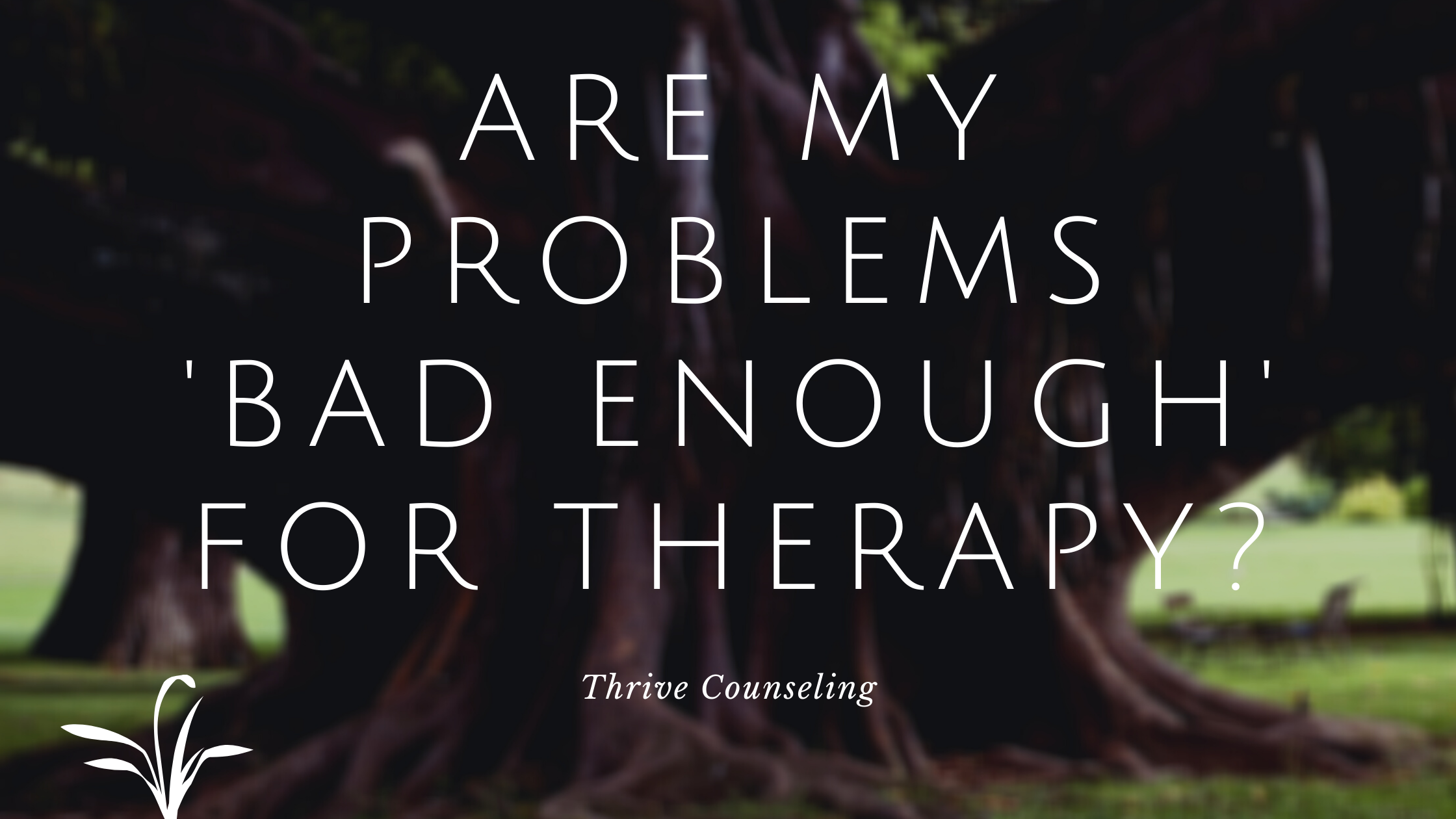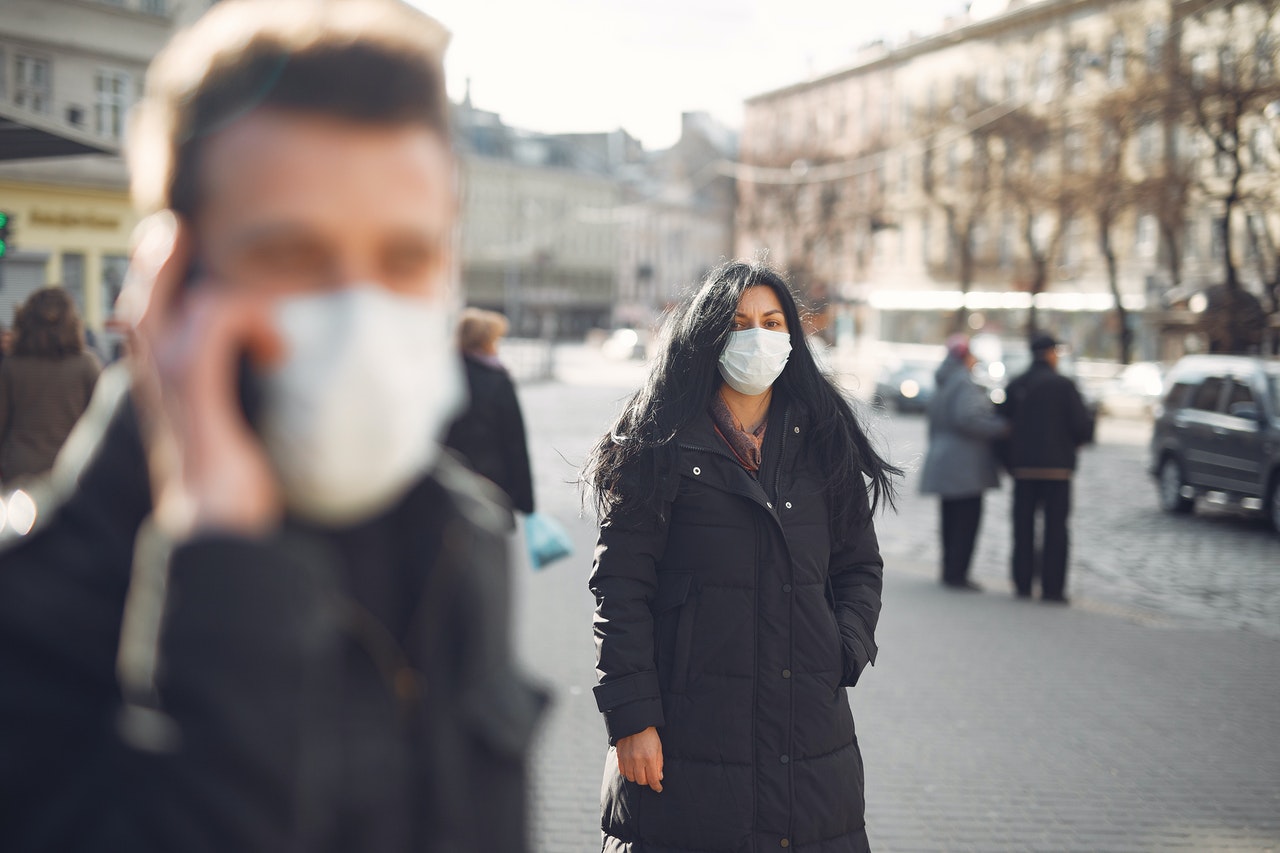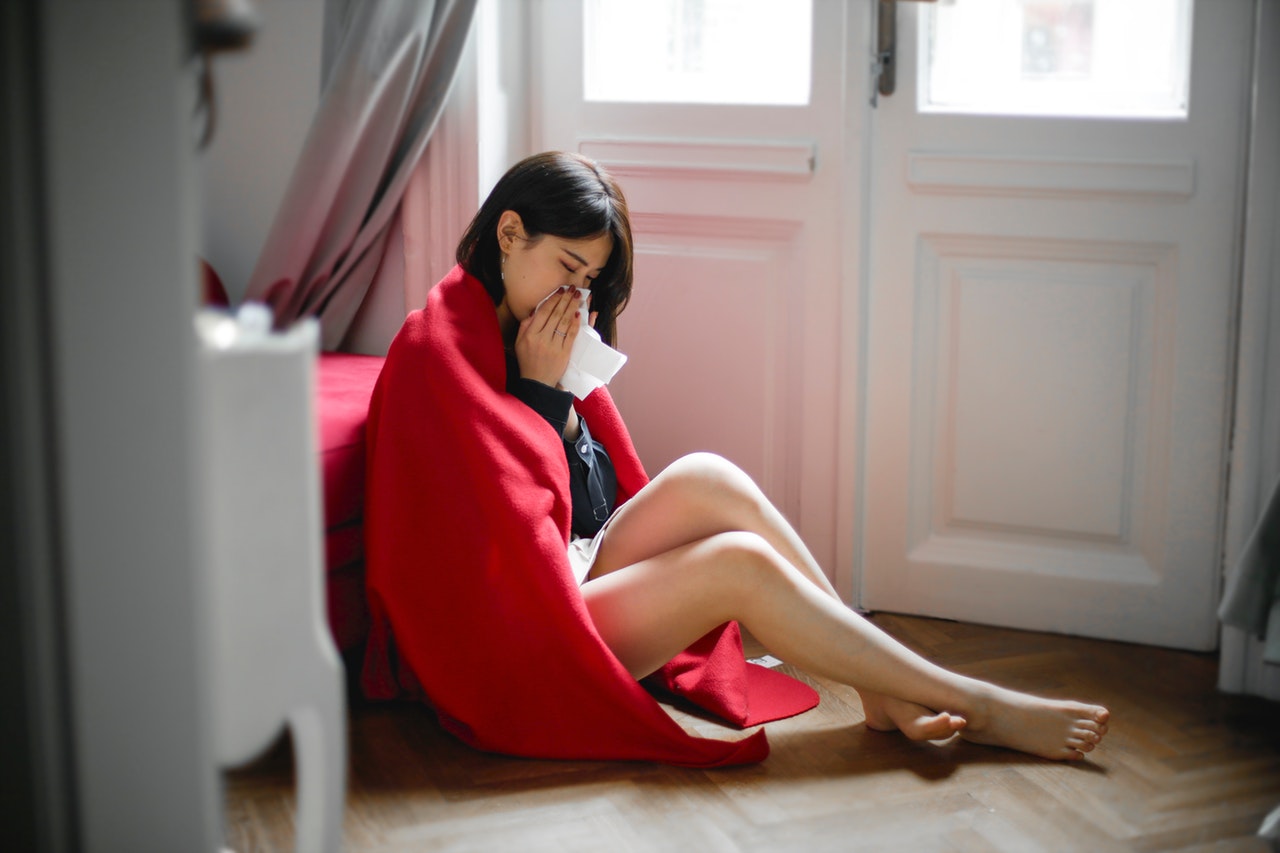Denver’s Mental Health is Strained During Coronavirus
If you’re feeling the strain on your mental health, you are not alone.
If you’re feeling the strain on your mental health, you are not alone.

If you’ve asked yourself whether your problems are bad enough to see a therapist, that means something.

The truth is powerful, but how do you be direct without seeming rude? Learn the secret to assertive communication, the most effective way to talk.

Getting a diagnosis of Bipolar Disorder can be overwhelming. It’s a big diagnosis, but with the right treatment many people are living normal and happy lives with Bipolar Disorder.

During the pandemic, we are learning how to show up for our clients in a new way. We therapists are seeing thier strength and resilience.

How to deal with Anxiety How do you deal with anxiety? Anxiety is normal. Everyone has anxiety from time to time. But it’s uncomfortable and no one likes it. At Thrive Counseling, we see anxiety every day and work with our clients to reduce and manage it. Anxiety counseling is very effective; you don’t have to suffer with it. Normally counseling for anxiety starts with exploring the symptoms and causes of anxiety, and then moves into dealing with anxiety using coping tools, specific strategies and also understanding each person’s triggers for anxious thoughts and feelings. Physical Symptoms of Anxiety Everyone has felt anxiety to some degree. We feel it in our minds and bodies with our nervous system responds to a trigger. Anxiety manifests in the body in several ways. Here are the most common physical symptoms of anxiety: Pounding heart Sweating Headaches Shaking or trembling Dizziness Shortness of breath Upset stomach Low appetite Muscle tension or twitches Shortness of breath Insomnia (difficulty sleeping) Anxiety can look different in different individuals, however. Here’s some less common physical symptoms of anxiety: Ringing in the ears Brain fog or feeling ‘spacey’ Difficulty concentrating Numbness in hands or feet Stomach cramps Frequent urination or diarrhea For most people, anxiety counseling reduces or eliminates all of their physical symptoms. For some people, adding anti-anxiety medication to counseling will be the best treatment option. Causes of Anxiety In anxiety counseling, one of the first things we do is pinpoint the causes of anxiety. This can vary from person to person, but there are some commonalities. Causes are also sometimes called triggers. Identifying your own triggers for anxiety can put you back in control of your feelings, and can help you know when to use coping tools. We can break the causes of anxiety into two categories: internal and external. Internal causes are related to what’s happening inside your body. External causes of anxiety are those that come from the external world. Internal causes of anxiety include: Poor sleep habits or insomnia Poor eating habits (eating too much or not enough, or not eating regular balanced meals) Not getting enough movement or exercise Genetics (anxiety can run in families) Medical condition that causes anxiety (such as a thyroid condition) External causes of anxiety include: Stress at work or school Witnessing a traumatic event Being threatened by someone Instability in your living situation Financial stress Problems in relationships Use of drugs or alcohol Usually, there is not just one cause of someone’s anxiety; there are many causes, and many layers and nuances to anxiety and our response to it. Extreme Anxiety Do you feel like your level of anxiety is just too much? Do you feel panicky and on edge most of the time? Do you feel a chronic, everyday low-level sense of anxiety or dread? If this is the case, it’s time to talk to a counselor and get evaluated for an anxiety disorder. Everyone feels anxiety from time to time, but when anxiety gets in the way of living your life, you may have an anxiety disorder . We treat anxiety disorders all the time at Thrive Counseling; it’s one of the most common issues clients come to us with. The good news is that an anxiety disorder, or extreme anxiety, is very treatable. Usually within 10-12 sessions with a counselor, anxiety is under control and clients feel like themselves again. If you’d like to talk to a counselor about extreme anxiety, contact us and we will get you right in for an appointment. How to Deal with Anxiety There are many effective strategies to deal with anxiety when it pops up in your life. Here are a few coping tools that counselors teach their clients in anxiety therapy. Mindfulness skills for anxiety Mindfulness skills teach you how to slow down, be in the moment, slow your thoughts, and calm your body. Ultimately, you learn how to respond to what’s happening around you and inside you, rather than simply reacting to it. You can learn mindfulness skills on your own through a book or e-course, or work with a counselor one-on-one. Analyzing your thoughts This is a common technique in Cognitive-Behavioral Therapy (CBT) to deal with anxiety. The basic idea is you learn to observe your own thoughts and the common patterns and narratives you use. Sometimes our thoughts are calm and rational. Sometimes, if we really look at them, our thoughts are overreacting or not serving us very well. If you’re anxious, take some time to write down your thoughts. Are they true? Do they sounds calm and rational? If not, is there another way of looking at this situation that’s more in line with reality? What would your best friend say to you in this situation? Try to reframe your thoughts in a calmer way. Regulate your body A very simple way to deal with anxiety is to block the causes of anxiety. The tope three things you can control that will regulate your body and stop anxiety is to have good sleep, eat a balanced diet, and move your body every day. When we sleep well, eat well, and get some exercise our whole nervous system tends to calm down. We feel much less anxious and are able to deal better with the problems we encounter during the day.

Covid19 is affecting most people’s mental health. Here’s how to assess yourself and how to cope.

During the Coronavirus crisis, social distancing is priority number one. But social distancing doesn’t mean that our need for connection and relationships ends. In fact, during times of stress or uncertainty, we need people more than ever. In fact, I really hate the term “social distancing.” To fight the virus we need physical distancing, but we can still be social. I know it looks a little different now, but connection can still happen even while we all work hard to “flatten the curve” and fight Covid-19. I get it, it’s really hard right now to pay attention to your mental health and hold on to social connections. At I write this, I am working from home via telehealth while taking care of my two kids (ages 4 and 1). My husband is also working from home. We have one home office between us, so there’s a constant juggle. I love my husband, but I miss my friends and coworkers. I miss chatting with my neighbors at our local coffee shops and restaurants. I miss my yoga teacher and the other parents at my daughter’s preschool. Life just doesn’t feel normal right now, and that’s because it’s not. I’ll share how I’m fostering connection and social support for myself right now, and what I’m helping our clients do as well: Remember phone calls? Time to bring them back Remember when we called people on the phone? Like actually called them? We heard their voice and hey heard ours too. Let’s bring that back. I know it can feel really strange. If you feel nervous about it, ask your friends to have a phone date. Yes, you really can make a phone date. Here’s an actual text conversation I had two days ago with my best friend: Me: This is all so hard. I miss seeing you. Can we have a phone date tonight? Her: Yes! What a great idea. When I get the kids down at 8pm I’ll call you. Me: Perfect! Virtual Happy Hours-it’s a Coronavirus thing Virtual happy hours are really great. I was skeptical at first, but give it a try! I decided to take the plunge and set up a virtual happy hour with 6 friends last night. I texted all of them and said that it was happening at 8, and I would send out the link. BYOB of course. At 8pm everyone showed up via Google Hangouts. We laughed and commiserated with each other. We played the guessing game “who has the most toilet paper in their house right now?” It was a great release for all of us. Don’t be afraid to ask for what you need Everyone is feeling isolated right now. I can tell you that our clients are sharing feelings of stress, loneliness and isolation. This is a good time to practice putting those feeling into words, and those words into requests so that friends and family can show up for you and support you. Everyone has different needs in relationships, so take a moment to think about what others usually do that make you feel supported, seen, and valued. Maybe it’s talking on the phone, or maybe it’s a simple text to say “I’m thinking of you.” Perhaps it’s a virtual book club. Whatever you need, try to ask loved ones and see how they respond. Here’s some ideas you can use: I’m going so stir-crazy at home! Want to play an online board game tonight with me? I’m feeling scared because I have my own health issues, can we talk about it? This is such a stressful time! I’m going to send you a text if I need to vent, is that okay? Remember you are not alone. There is a unique opportunity we all have right now in the midst of this crisis to honor the fact that we are all in this together. We usually imagine we are the only one that feels left out, lonely, or isolated. Right now, everyone feels this way. Professionals can help too Most therapists, like our team, are now providing online therapy. It’s easy to set up and see your therapist from the comfort of your home. If you find yourself feeling anxious, depressed, hopeless, or overwhelmed, therapy can help. We are seeing clients for both long-term and short-term therapy. It can help to have someone on your team who is trained to tackle these issues.

Every time I start this article, I edit it less than a day later. That’s how fast COVID-19 (or coronavirus) is evolving. When I first started, Colorado had no cases. Now there are 77. Who knows how many there will be by the time you read this. The point is, it’s a big deal, and it’s causing a lot of people a lot of anxiety. More Coloradans than ever are reporting poor mental health, and if you’re living with anxiety, obsessive-compulsive disorder, depression, or chronic illness, your natural feelings of worry may be even more heightened. So, how does the city of Denver convince itself to get out of bed every day in the face of a national emergency? Let’s talk about self-care Set realistic expectations and establish boundaries. Be honest with yourself. If you’re over 60, chronically ill, or immune-suppressed, this may mean staying home and limiting non-essential travel. It’s hard news to take, so be gentle. But once you know where your limitations lie, it’s time to set boundaries and inform family and friends of your decision. Meditate What’s a good way to meditate if you’ve never done it before? First, sit or lie down comfortably. The couch or bed is good, or a very comfy office chair. Next, you close your eyes. Breathe naturally. For me, I like to count my breaths as I breathe in and out. Don’t control it, just notice it. Observe your body’s movements, how your shoulders, chest, and stomach all rise and fall. Continue this for two to three minutes, and then try it for longer periods. If you notice your mind wandering, focus on your breathing again. Line up a support system This is useful in many ways. Not only does it help with loneliness in the face of social distancing, setting up regular contact with friends and family helps you stay up to date on health statuses. You may also want to ask them for help later. Make lists This is a common strategy to combat anxiety, but it’s extremely useful here as well. What in particular are you stressed about? Is it a list of items you need to track down to stock up for quarantine? Is it a list of things you need to take with you if you need to travel to a friend or family member? Is it the same anxiety you wake up with every day, amplified by one billion? Write it down and walk away from it for a bit. You may find that putting it on paper (or in your phone) stops it from rattling around quite so loudly inside your head. Recognize coronavirus (COVID-19) symptoms. The World Health Organization recommends you stay at home if you feel sick, even if it’s just a slight runny nose. If you have a fever, cough, or difficulty breathing, it’s time to seek medical treatment. Call ahead to your local primary care provider, urgent care, or emergency room to make sure you’re directed to the proper health care facility. This not only saves you time, it also helps prevent the possible spread of COVID-19. Establish a healthy sleep routine Sleep plays a critical role in both your mental and physical health. It’s important for a healthy adult to get at least seven hours. So, what can you do to improve your sleep? Set a sleep schedule if you can. Go to sleep and wake up at the same time each day. Avoid large or heavy meals too close to bedtime. Use your bed for sleep and sex only – no TV, no video games, no reading, and no blue light devices. DEARMAN: A Tool to Set Boundaries You know those boundaries I asked you to set, and the help and resources I wanted you to get? And how you’re already anxious and freaking out? Don’t worry, I’ve got a tool for you to use to make doing those things easier. It’s called DEARMAN. It’s an acronym for a therapy skill used to communicate what you want (or to say no!) in an effective way. Here’s what it stands for: Describe the situation (“President Trump has declared a national emergency and I’m running out of food”) Express your feelings (“I am feeling very agoraphobic today and I’m too anxious to go outside”) Assert (“If I give you money for groceries can you please bring them to me?”) Reinforce (“It would really mean a lot to me”) Mindful (Stay focused on this moment and don’t engage in defensiveness or hostility) Assertive (Be matter of fact about your request and assert yourself) Negotiate (After you finish your DEARMAN, the other person may have their own point of view. Hear them out. You may have to negotiate a little and meet halfway.) Self-soothe The concept is to really, really participate and focus on one thing. It can be closing your eyes and focusing on the smell and the steam and the taste of a cup of tea. It’s different for everyone, so give a few a try until you find the one that’s right for you – but it’s important not to use this as an excuse to justify damaging behaviors that harm your mind or body, so be mindful of that, too. Talk to Thrive Counseling! We love to serve our clients by listening deeply, offering incredibly helpful tools and strategies, and walking with you on your journey. We will be offering every client teletherapy sessions via computer, and our HIPAA-compliant software is entirely confidential.

There are many different causes and manifestations of anxiety. This article reviews the causes of anxiety, different anxiety disorders, and how to start treatment.

What is PTSD? Post-traumatic stress disorder (PTSD) is a mental health condition that is triggered by a terrifying event of some sort. Experiencing it yourself can be just as traumatizing as witnessing it. Any event, or series of events that overwhelms you with feelings of hopelessness and helplessness and leaves you emotionally shattered, can trigger PTSD. This may happen especially if the event feels unpredictable and uncontrollable. Most people who go through traumatic events may have temporary difficulty adjusting and coping with the things they have been through, but with time and good self-care, they usually can get better on their own. But if the symptoms get worse, last for months or even years, and interfere with your day-to-day functioning, you may have PTSD. Symptoms of PTSD can start right after experiencing a traumatic event, but it is also normal to start a few weeks later or in some cases even after several years. Survivor’s guilt can be a direct result of a traumatic event that causes PTSD. The Columbine school shooting here in Denver for example has impacted many, many people and one case was described in this article. The mother of one shooting survivor who died by suicide shared her daughter’s PTSD and survivor guilt. The father of the young Columbine victim had struggled with prolonged grief over 6 years after his daughter’s death, according to his wife. How do I know if I have PTSD? PTSD is diagnosed when symptoms last longer than one month. It is very important to seek professional help as soon as possible to prevent the symptoms from getting more intense. Symptoms of PTSD include the following: Trouble sleeping and/or concentrating Unwanted and distressing flashbacks to the event Unprovoked anger and aggressive behavior Feeling detached from family and friends Negative thoughts and a feeling of hopelessness about yourself, others and the world in general Avoiding memories of the traumatic event Self destructive behavior, such as dangerous driving, using drugs, alcohol abuse etc. How to treat PTSD One form of treatment is behavioral therapy, called eye movement desensitization and reprocessing (EMDR). EMDR incorporates elements of cognitive-behavioral therapy with eye movements or other forms of rhythmic, left-right stimulation, such as hand taps or sounds. These techniques work by “unfreezing” the brain’s information processing system, which is interrupted in times of extreme stress. Here at Thrive Counseling in Denver, you can connect with Julia Hofman, if you are looking for a therapist that is trained in EMDR. Trauma-focused cognitive-behavioral therapy is another form of treatment and involves gradually “exposing” yourself to feelings and situations that remind you of the trauma, and replacing distorted and irrational thoughts about the experience with a more balanced picture. Recovery from PTSD is a gradual, ongoing process. Healing doesn’t happen overnight, nor do the memories of the trauma ever disappear completely. Here are some ways to cope with PTSD in a positive way: Learn about trauma and PTSD Join a support group Practice relaxation techniques such as yoga, meditation or focused deep breathing Talk about your symptoms to a person you trust Spend time with positive people Avoid alcohol and drugs Spend some time in nature (for relaxation, seclusion and peace) Exercise (the released endorphins can improve your mood and general outlook) Volunteer – this is a great way to connect to others in a positive way and regain your sense of control and self worth Choose healthy foods – Omega 3s play a vital role in emotional health so incorporate foods such as fatty fish, flaxseed, and walnuts into your diet. Limit processed food, fried food, refined starches, and sugars, which can exacerbate mood swings and cause fluctuations in your energy Focus on getting enough restful sleep A recent article by the Denver Post revealed that first responders are a group that is especially impacted by PTSD due to the traumatic nature of their jobs. Seven first responders from different departments in Denver have committed suicide in the last two years – which is seven times the national average. The departments are reacting and offering more mental health awareness and education. If you are experiencing symptoms of PTSD or need to work through a trauma of any kind, please reach out to a therapist. We here at Thrive Counseling offer free consultations and all of our therapists are trained in and have experience with working with clients who have experienced trauma.

There’s so many therapists to wade through, here’s how to find the right one in your neighborhood.